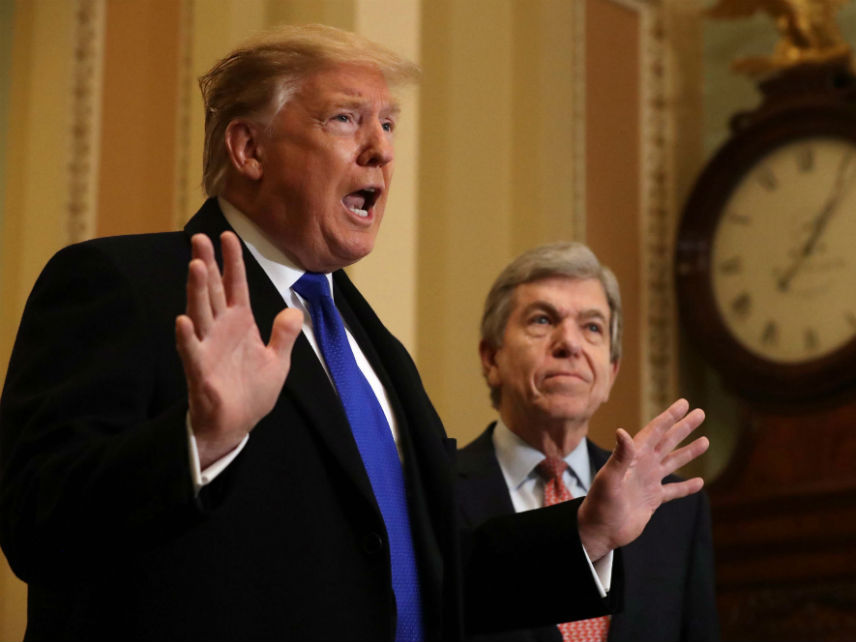Prison Reform Bill Passes The House; Is Prison Reform Dead?
The House passed a major, bipartisan prison reform bill backed by the White House, but it's being attacked from all sides.


The House passed legislation that would introduce several significant reforms to the federal prison system today, but the bill's future is uncertain and its passage has openly divided a criminal justice coalition that has worked together, at least in public, for the past several years.
The FIRST STEP Act, which includes a number of substantive changes to the federal prison and reentry system, passed by a vote of 360-59 and now goes to the Senate, but advancing to the White House is not a sure thing. Democrats are split on it, old-school conservatives are drumming up opposition from law enforcement groups, and progressive advocacy groups are attacking it from the left. Sen. Chuck Grassley (R-Iowa), the chair of the Senate Judiciary Committee and the Republican pointman on criminal justice reform, says the bill is dead in the water unless it includes major reforms to federal sentencing law as well.
Trying to keep the whole thing from falling apart are a bipartisan group of House members, the White House—where prison reform has been a priority for President Trump's son-in-law and senior adviser Jared Kushner—and criminal justice groups who say some progress is better than none.
"I think unfortunately there are groups that would like to see sentencing reform happen right now and are not willing to settle for less," says Jessica Jackson Sloan, co-founder of #Cut50, a group that works to lower the U.S. prison population. "In some ways it's strategic because they helped us to make this bill as good as it can be, but at this point it's splitting the Democrat vote and we need a strong show of support to have this taken up in the Senate."
Among other things, FIRST STEP would
- allow inmates to accrue up to 54 days of good time credit a year. The changes would apply retroactively, resulting in the release of approximately 4,000 federal inmates, according to the U.S. Justice Action Network, a criminal justice advocacy group.
- ban the shackling of pregnant inmates, including while giving birth and postpartum. It would also require Bureau of Prison facilities to provide female hygiene products free of charge and increase available phone and in-person visitations for new mothers.
- require the Bureau of Prisons to place inmates in facilities within 500 driving miles of their families.
- increase the use of compassionate release for terminally ill inmates, and require new reporting on how many applications for compassionate release are accepted or denied.
The bill has sharply divided Democrats. On one side is Rep. Hakeem Jeffries (D-N.Y.), the bill's co-sponsor, and others who say it would provide better conditions and the possibility of earlier release for the roughly 180,000 inmates serving time in federal prison.
"Any objective reading of this bill is that it will improve inmates' quality of life," Jeffries said on the House floor prior to the vote.
On the other side are Democrats who say the good provisions in the bill are outweighed by core concerns over how the overcrowded, underfunded Bureau of Prisons system would handle the new programs and changes. In a "dear colleague" letter released last week, Sen. Dick Durbin (D-Ill.), Sen. Cory Booker (D-N.J.), Sen. Kamala Harris (D-Calif.), Rep. John Lewis (D-Ga.), and Rep. Sheila Jackson-Lee (D-Tx.) wrote that the reforms would fail without broader sentencing reforms.
"These fundamental concerns are not simply that the FIRST STEP Act does not 'go far enough,'" the lawmakers wrote, "but instead that the recidivism reduction plan that is the core of the bill could actually worsen the situation in our federal prisons by creating discriminatory non-evidence based policies."
Meanwhile in the Senate, Grassley and a bipartisan group of co-sponsors are pushing the Sentencing Reform and Corrections Act, which includes reductions to federal mandatory minimum sentences. The bill is the result of years of negotiation between Senate Republicans and Democrats, and the lead negotiators don't want to see their work languish.
"With the President's encouragement, I believe we can reach a deal on criminal justice reform," Grassley said in a statement Tuesday. "For that deal to pass the Senate, it must include sentencing reform. This is necessary for practical as well as political reasons."
However, sentencing reform is a non-starter for the White House, where Attorney General Jeff Sessions—a staunch opponent of criminal justice reforms—holds sway.
Last Friday, the White House held a prison reform summit to push for the bill.
"Sentencing reform is something people still have different opinions on," Kushner said when asked why it wasn't being included in the bill. Kushner also said that, while he appreciated the efforts, "they've been trying to do sentencing reform for the past eight years and they've done nothing."
Criminal justice advocacy groups, too, are divided on the legislation. Organizations like Families Against Mandatory Minimums, #Cut50, the U.S. Justice Action Network, the Equal Justice Initiative, and Koch Industries support it. They all also want to see sentencing reform, but agree that the bill, as its name suggests, is a first step toward broader reforms.
"Roughly 96 percent of federal inmates will one day be released, so common-sense dictates that our prisons allow for programs that help individuals leave prison in better shape than when they went in," Koch Industries general counsel Mark Holden said in a statement. "States have proven that preparing prisoners for reentry starting on day one of their sentences will increase public safety, reduce recidivism, bring incarceration rates down and save taxpayers money."
But on a conference call with reporters last Friday, the American Civil Liberties Union (ACLU), NAACP Legal Defense Fund, and several other organizations said the bill fell far short of their requirements. ACLU senior legislative council Jesselyn McCurdy said the bill is only "masquerading as some form of criminal justice reform."
Its rehabilitation provisions exclude too many inmates, its risk-assessment program would in fact exacerbate racial disparities in the Bureau of Prisons system, and there aren't enough halfway houses to implement the bill's core parts, the groups argued.
On other side of the political spectrum, Politico reported that Sen. Tom Cotton (R-Ark.), who once argued that the U.S. has an under-incarceration problem, was coordinating with law enforcement groups to oppose the bill.
In letters to Congress, the National Sheriffs' Association and Federal Law Enforcement Officers Association expressed "deep concerns" about the bill.
"In its current form, this legislation authorizes the early release of thousands of convicted armed violent criminals and repeat drug traffickers through retroactively increasing good time credits and program participation credits," the National Sheriffs' Association wrote.
For supporters of the bill, the last few months have felt like an unending game of whack-a-mole.
"One obstacle pops up and you knock it down," says Holly Harris, Executive Director at the U.S. Justice Action Network. "This has been a delicate dance from the beginning. I think this will be the most well-vetted bill that Congress has seen in years. It's been a long time coming, and those who stand in the way of progress, those will be the losers in this situation."
The White House remains confident. During the prison reform summit on Friday, Trump expressed his usual sunny optimism.
"Get a bill to my desk," Trump said. "I will sign it, and it's going to be strong, it's going to be good, it's going to be what everybody wants."
But if the last few months have shown anything, it's that, when it comes to criminal justice reform, no one gets everything they want.


Show Comments (11)